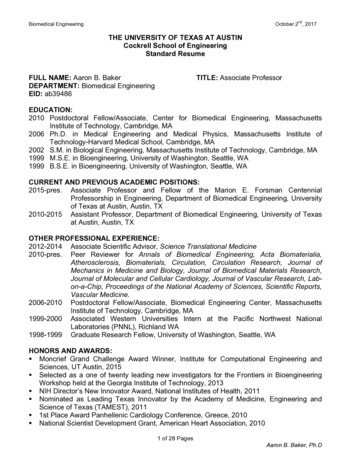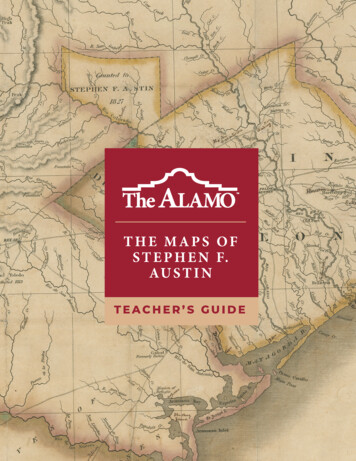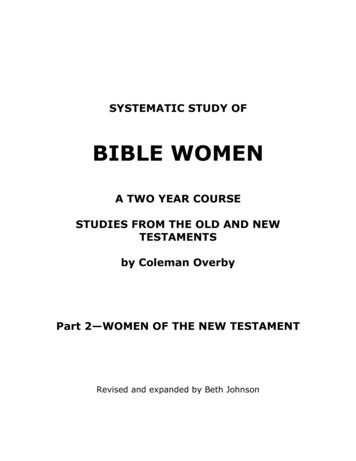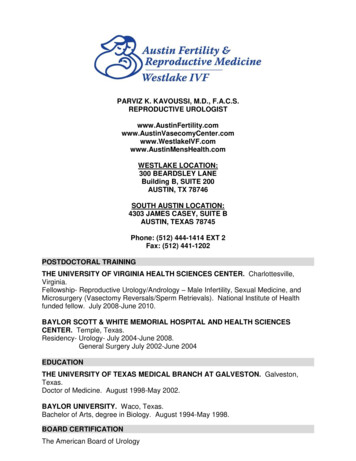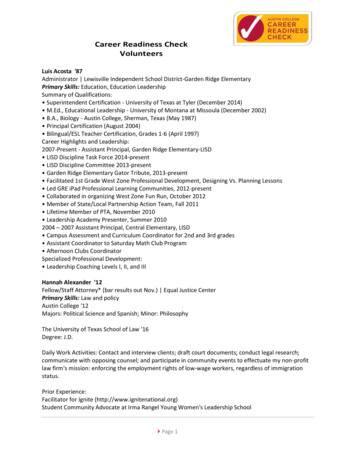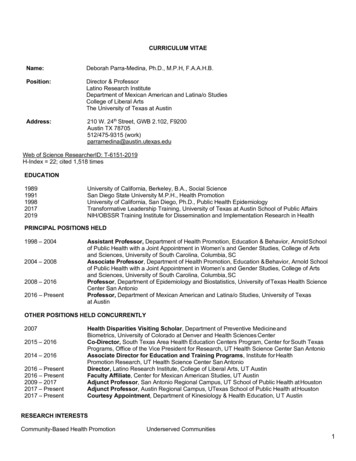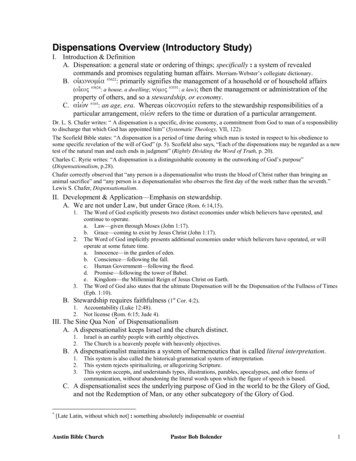
Transcription
Dispensations Overview (Introductory Study)I. Introduction & DefinitionA. Dispensation: a general state or ordering of things; specifically : a system of revealedcommands and promises regulating human affairs. Merriam-Webster’s collegiate dictionary.B. οἰκονοµία #3622: primarily signifies the management of a household or of household affairs(οἶκος #3624: a house, a dwelling; νόµος #3551: a law); then the management or administration of theproperty of others, and so a stewardship, or economy.C. αἰών #165: an age, era. Whereas οἰκονοµία refers to the stewardship responsibilities of aparticular arrangement, αἰών refers to the time or duration of a particular arrangement.Dr. L. S. Chafer writes: “ A dispensation is a specific, divine economy, a commitment from God to man of a responsibilityto discharge that which God has appointed him” (Systematic Theology, VII, 122).The Scofield Bible states: “A dispensation is a period of time during which man is tested in respect to his obedience tosome specific revelation of the will of God” (p. 5). Scofield also says, “Each of the dispensations may be regarded as a newtest of the natural man and each ends in judgment” (Rightly Dividing the Word of Truth, p. 20).Charles C. Ryrie writes: “A dispensation is a distinguishable economy in the outworking of God’s purpose”(Dispensationalism, p.28).Chafer correctly observed that “any person is a dispensationalist who trusts the blood of Christ rather than bringing ananimal sacrifice” and “any person is a dispensationalist who observes the first day of the week rather than the seventh.”Lewis S. Chafer, Dispensationalism.II. Development & Application—Emphasis on stewardship.A. We are not under Law, but under Grace (Rom. 6:14,15).1.The Word of God explicitly presents two distinct economies under which believers have operated, andcontinue to operate.a. Law—given through Moses (John 1:17).b. Grace—coming to exist by Jesus Christ (John 1:17).2. The Word of God implicitly presents additional economies under which believers have operated, or willoperate at some future time.a. Innocence—in the garden of eden.b. Conscience—following the fall.c. Human Government—following the flood.d. Promise—following the tower of Babel.e. Kingdom—the Millennial Reign of Jesus Christ on Earth.3. The Word of God also states that the ultimate Dispensation will be the Dispensation of the Fullness of Times(Eph. 1:10).B. Stewardship requires faithfulness (1st Cor. 4:2).1. Accountability (Luke 12:48).2. Not license (Rom. 6:15; Jude 4).III. The Sine Qua Non* of DispensationalismA. A dispensationalist keeps Israel and the church distinct.1.2.Israel is an earthly people with earthly objectives.The Church is a heavenly people with heavenly objectives.B. A dispensationalist maintains a system of hermeneutics that is called literal interpretation.1.2.3.This system is also called the historical-grammatical system of interpretation.This system rejects spiritualizing, or allegorizing Scripture.This system accepts, and understands types, illustrations, parables, apocalypses, and other forms ofcommunication, without abandoning the literal words upon which the figure of speech is based.C. A dispensationalist sees the underlying purpose of God in the world to be the Glory of God,and not the Redemption of Man, or any other subcategory of the Glory of God.*[Late Latin, without which not] : something absolutely indispensable or essentialAustin Bible ChurchPastor Bob Bolender1
IV. The Dispensation of AngelsA. The Age of Obedient Service (Ezek. 28:12-15a).B. The Age of Satanic Revolt (Ezek. 28:15b-19; Isa. 14:12-21; Jer. 4:23-26).The Angelic world (original Earth) is only described in Scripture with very brief & sketchy information. Therecognition of the role of man in bearing testimony to the angelic realm is an important feature for advanceddispensational studies. The Church is the key testimony to grace in God the Father’s perfect resolution of the AngelicConflict (Eph. 3:10).V. The Dispensation of Man (from Adam to Abraham; Gen. 1:28-11:9).A. The Age of Innocence (Adam & Eve, before the fall; Gen. 1:28-3:6).1.2.3.The stewardship of God’s plan on Earth was vested in the Gentiles under the federal headship of Adam(humanity).The responsibility of sinless man was to tend the garden and not eat of the forbidden tree (Gen. 2:15-17).The duration of this age is not known, but it ended with the failure of Adam and Eve to fulfill theirresponsibilities in the plan of God (Gen. 3:6).B. The Age of Conscience (from the Fall of Adam to the Flood; Gen. 3:6-8:14).1.2.3.The stewardship of God’s plan on Earth continued to be vested in the Gentiles under the federal headship ofAdam (humanity).The responsibility of sinful man was to respond to God through the promptings of his conscience(Rom. 2:15). Part of the faithful responding in this age involved the bringing of a blood sacrifice(Gen. 3:21; 4:4).The duration of this age is not known, but has been estimated as being at least 1656 years, and probably quitelonger. This age ended with the failure of sinful man to fulfill their responsibilities in the plan of God(Gen. 6-8).C. The Age of Human Government (from the Flood to the Tower of Babel; Gen. 8:15-11:9).1.2.3.The stewardship of God’s plan on Earth continued to be vested in the Gentiles under the federal headship ofAdam (humanity).The responsibility of the Gentiles was to function within the arrangement of families and nations, underinstitutions of human government, giving glory to God for His work. Part of the faithful responding in thisage involved the enforcement of civil law, even to the extent of capital punishment.The duration of this age is not known, but has been estimated as being at least 400 years, and possibly quitelonger. This age ended with the failure of the descendants of Noah to fullfill their responsibilities in the planof God, and the dispersion of the nations at the Tower of Babel (Gen. 11).VI. The Dispensation of Israel (from Abraham to Christ) (Gen. 11:10-Acts 1:26).A. The Age of Promise (Heb. 6:15; 11:9) (from the call of Abraham to the giving of the Law;Gen. 11:10-Ex. 18:27).1.2.3.The stewardship of God’s plan on Earth is vested in the Jews, under the federal headship of Abraham, Isaac,and Jacob.The responsibility of the Jews was to live in the promised land, and believe and obey God.This age lasted 430 years (Gal. 3:16,17), and ended in failure. The failure on the part of the children of Israelresulted in their captivity in Egypt.B. The Age of Law (from the giving of the Law of Moses, to the birth of Jesus Christ;Ex. 19:1-Mal. 4:6).1.2.3.The stewardship of God’s plan on Earth is vested in the Jews, under the federal headship of Abraham, Isaac,and Jacob.The responsibility of the Jews was to live under the 613 commandments of the Mosaic Law.This age lasted approximately 1440 years, and ended in failure.C. The Age of the Incarnation (the Earthly life and ministry of Jesus Christ; Matt. 1:1-Acts 1:26).1.2.3.The stewardship of God’s plan on Earth is vested in the Jews, under the federal headship of Abraham, Isaac,and Jacob.The responsibility of the Jews was to accept their Christ. Something greater than the Law was here(Matt. 12:1-8).This age lasted approximately 34 years, and ended in failure. The Jews rejected their Christ, and crucifiedHim.Austin Bible ChurchPastor Bob Bolender2
D. The Age of the Tribulation (the seven year time of Jacob’s trouble; Rev. -19).1.2.3.The stewardship of God’s plan on Earth is vested in the Jews, under the federal headship of Abraham, Isaac,and Jacob.The responsibility of the Jews will be to faithfully await the return of the Lord.This age will last approximately 7 years, and end with the return of Christ on Earth.VII. The Dispensation of the Church.A. The Age of the Apostles.1.2.3.The stewardship of God’s plan on Earth is vested in the Church, under the federal headship of Jesus Christ,and under the leadership of His Apostles.The responsibility of the Church was to proclaim the Gospel of Jesus Christ, to lay the foundation of theChurch in the New Testament, and to await the Lord’s return.This age lasted approximately 70 years, and ended with the death of the Apostle John, approximately 100AD.B. The Age of the Local Church.1.2.3.The stewardship of God’s plan on Earth is vested in the Church, under the federal headship of Jesus Christ,and under the leadership of His Overseers and Deacons within the local churches.The responsibility of the Church is to proclaim the Gospel of Jesus Christ, and to build upon the foundationwhich was laid by the Apostles and Prophets. Part of the fulfillment of this responsibility is the systematicand complete proclamation of the Word of God.This age has currently lasted over 1900 years, and will end at the Rapture of the Church, and the JudgmentSeat of Christ (1st Thess. 4:16,17; 1st Cor. 15:51-53; Rom. 14:10; 2nd Cor. 5:10).VIII. The Dispensation of The Kingdom of Heaven on Earth.A. The Age of Conquest.1.2.3.The stewardship of God’s plan on Earth is vested in the Lord Jesus Christ, and His resurrected saints.The responsibility of the Lord Jesus Christ, and His resurrected saints is to destroy this present kosmossystem, and throw down Satan, his fallen angels, and the Antichrist.This age will last an undetermined, but short period of time, and will end with the Sheep & Goat Judgment.B. The Age of Reign.1.2.3.The stewardship of God’s plan on Earth is vested in the Lord Jesus Christ, and His resurrected saints.The responsibility of the Lord Jesus Christ, and His resurrected saints is to proclaim the Word of God to thenations of the Earth.This age will last 1,000 years, and end with the Final Satanic Revolt.C. The Age of Revolt.1.2.The stewardship of God’s plan on Earth is vested in the Lord Jesus Christ, and His resurrected saints.The responsibility of the Lord Jesus Christ, and His resurrected saints is to rest in faith, and observe God theFather smash the Final Satanic Revolt.3. This age will last for an undetermined, but short period of time, and will end with the Great White ThroneJudgment.IX. The Dispensation of the Fulness of Times (Eph. 1:10).A. The stewardship of God’s plan on the new Earth, and in the new heavens is vested in the LordJesus Christ, and His resurrected saints, ministering to sinless man.B. The responsibility of the Lord Jesus Christ, and His resurrected saints is to proclaim theultimate revelation of God the Father through Jesus Christ as the Eternal Father (Isa. 9:6;Rev. 21:7).C. This dispensation will last for a thousand generations (Deut. 7:9; Ps. 105:8), and end when theLord Jesus Christ delivers up the kingdom to God the Father (1st Cor. 15:24,28).Austin Bible ChurchPastor Bob Bolender3
EternityPastΑAngelsFaithful ServiceRevolutionManInnocenceVolition TestMarriage TestConscienceFamily TestNational ostolicLocal ChurchChristMillenniumFullness ofTimesEternityFutureΩDefinitionsDispensation: An orderly arrangement of stewardship responsibilities. God has Sovereignly vestedparticular stewardship responsibilities to specific corporate bodies on various occasionswithin His overall Grace Eternal Plan.οἰκονοµία oikonomia #3622: management of a household, stewardship.Age:A period of time within a Dispensation during which unique circumstances and detailsof that stewardship are distinguished.αἰών aiōn #165: period of time, age, world.MythsCritics of Dispensational Theology often attack Dispensationalism as being a 19th century invention ofJ.N. Darby. If the Bible student simply examines the issue logically, from the text, even Covenanttheologians are actually dispensationalists. As Chafer said, “Any person is a dispensationalist whotrusts the blood of Christ rather than bringing an animal sacrifice.”For those who think that Darby was the first to differentiate between law & grace, Israel & Church,Old Testament & New Testament, the evidence is overwhelming to the contrary. For example,Irenaus, (Against Heresies, 3.10.4) [AD120-202] distinguished between “the legal dispensation” and “the newdispensation of liberty.”“Distinguish the ages and the Scriptures harmonize.” St. AugustineUltimately, the Bible student is charged by the Bible itself to rightly divide the Word of Truth(2nd Tim. 2:15).DistinctionsThe descendants of Abraham, Isaac, and Jacob, belonging to one of 12 particular tribes(13 including the tribe of Levi). All human beings not descended from Abraham, Isaac,and Jacob are termed Gentiles. Israel is God’s earthly nation set apart and above allother earthly nations. In physical terms, Israel is divided into particular tribes. Inspiritual terms, believing Israel is to be distinguished from unbelieving Israel.The Church: The Body of Christ, built by Him subsequent to His first advent incarnation. Membersof this body are spiritual descendants of Abraham, by means of faith. The Church isone body in Christ, consisting of neither Jews (Israel) nor Gentiles. The Church is aheavenly nation drawn from believers of all earthly nations.Israel:Perhaps the greatest dispensational study for Bible students is to examine the nature, purpose &destiny of Israel, and the nature, purpose & destiny of the Church. An objective examination of thesetwo corporate bodies will consistently support the dispensational outlook of Scripture.Austin Bible ChurchPastor Bob Bolender4
Dispensational StudiesForwardI am most grateful to God the Father, and His Grace Eternal Plan. I am thankful for the way in which He communicatedHis Plan to mankind through the written word of God. I appreciate the historico-grammatical method of interpretation, asthe only fair and appropriate means to interpret the written Word that God has bestowed upon us. I am especially joyousfor the grace upon grace condition of my place in the Body of Christ—the Church of the living God.I must preface this study by quoting from John Edwards (1639-1716). In 1699 he published a two volume work,A Compleat History or Survey of all the Dispensations. The sentiments Edwards expressed in his preface are an accuratereflection of my own thoughts in this present work:“I Have undertaken a Great Work, viz. to display all the Transactions of Divine Providence relating to the Methods ofReligion, from the Creation to the end of the World, from the first Chapter of Genesis to the last of the Revelation. For Ihad not met with any Author that had undertaken to comprise them all, and to give us a true account of them according totheir true Series: nor had I lit upon a Writer (either Foreign or Domestick) who had designedly traced the particular causesand Grounds of them, or settled them in their right and true foundations. Wherefore I betook myself to this Work,resolving to attempt something, tho it were only to invite others of greater skill to go on with it.”Unlike Edwards, I have “lit upon” many writers who have worked extensively within the dispensational field of study. Ihave devoured the writings of J.N. Darby, Clarence Larkin, C.I. Scofield, James M. Gray, Lewis S. Chafer, J. DwightPentecost, R.B. Thieme Jr., Charles Ryrie, and many others. These men each labored extensively within this field of study,and I am blessed to have entered into their labors.With so much excellent work out there, and such a tremendous heritage firmly established, why write anything else? Whynot just place Charles Ryrie’s Dispensationalism in someone’s hand and be done with it?1 Isn’t Ryrie the current livingauthority on the subject, and the heir of the dispensational heritage? Such thoughts betray the very essence ofdispensational thought—rightly dividing the Word of Truth. Each Bible student is charged to be a diligent workman inpreparation for the Judgment Seat of Christ. I will be evaluated based upon my careful treatment of God’s Word, not uponmy faithful adherence to the writings of man.Why this work? Perhaps for clarification and simplicity—observing the similarities & differences in the diagrams andteachings of many solid men. Perhaps for the sake of a simple dispensational study guide with consistent vocabulary andpoints of reference for the believers of Austin Bible Church. Perhaps for the sake of settling my own mind in specific areasof unresolved considerations. If this happens, the Afterward should acknowledge it.“Wherefore I betook myself to this Work, resolving to attempt something, tho it were only to invite others of greater skillto go on with it.”DefinitionsBecause the dispensations we examine all transpire within the created realm of time, confusion often centers on the timeaspects of the study. C.I. Scofield made time itself an element of a dispensation in his own definition: “A dispensation is aperiod of time during which man is tested in respect of obedience to some specific revelation of the will of God. Sevensuch dispensations are distinguished in Scripture.”2Since the Bible uses two primary terms for dispensation and age, they should be treated individually. Careful definitions ofthe terms “dispensation” and “age” will sort out this issue.A dispensation is an orderly arrangement of stewardship responsibilities. God has Sovereignly vested particularstewardship responsibilities to specific corporate bodies on various occasions within His overall Grace Eternal Plan.Presently, stewardship is invested in the specific corporate body of the Church. Formerly, stewardship was invested in thespecific corporate body of Israel. Important distinctions between Israel and the Church will be discussed shortly.12Charles C. Ryrie, Dispensationalism 1995 revised & expanded from Dispensationalism Today 1966.C.I. Scofield, The Scofield Study Bible. Emphasis mine.Austin Bible ChurchPastor Bob Bolender5
In the Greek New Testament, the term dispensation is rendered by οἰκονοµία #3622: management of a household,stewardship.3 It comes from οἶκος #3624 house νόµος #3551: law. Another term is οἰκονόµος #3623: steward, householdmanager.An age is a period of time within a Dispensation during which unique circumstances and details of that stewardship aredistinguished. Changes in circumstances and details may occur—indeed quite startling changes may occur—withoutaffecting the designated stewardship. In these cases, with no change of stewardship occuring, the Dispensation continuesinto a new age.Simply stated, a dispensation is a stewardship, and an age is a time period within that stewardship which exhibits particularunique circumstances and details for those who are fulfilling (or not fulfilling) their stewardship. To illustrate, thestewardship (dispensation) of Israel will be broken down into its time periods (ages). Beginning with Abraham, the Dispensation of Israel functioned within the Age of Promise. Abraham, Isaac, andJacob all fulfilled their stewardship responsibilities under Promise. Jacob is renamed Israel, and his descendantsare then the specific corporate body invested with God’s stewardship responsibilities. Beginning with Moses, with the giving of the Law, the stewardship remained unchanged (continuing to be vestedin Israel) but the Dispensation of Israel functioned within the Age of Law. Beginning with the baptism of Jesus Christ by John the Baptist, the stewardship remained unchanged, butSomething greater than the Law was then present. The unique circumstances and details of the Age of Incarnationset apart the First Advent of Jesus Christ as a specific age within the Dispensation of Israel. Following the departure of the Church, Israel will be restored to her stewardship, and the Age of Tribulation willform yet another distinct and unique time period in the unfolding Grace Eternal Plan of the Ages for theMaximum Glorification of Jesus Christ.DistinctionsThe Bible Itself draws the biggest distinctions in Its division between Old Testament and New Testament. By Authoringone portion of Scripture in Hebrew, and the second portion of Scripture in Greek, the Lord put several matters onprominent display. Although there were Dispensations and Ages prior to Israel, the entire Old Testament body of Scripturewas written within the Dispensation of Israel. Although there will be Dispensations and Ages after the Church, the entireNew Testament body of Scripture was written within the Dispensation of the Church.Israel and the Church form the biggest centers of study within the realm of stewardship or dispensational matters.Dispensations prior to Israel and Dispensations following the Church are not developed with nearly the same breadth ofstudy simply because information regarding them is not as thoroughly presented in the Word of God. By virtue of what iscontained in the Scripture, basic observations and conclusions can be made regarding these less-known stewardships.These will be discussed in turn. The most thorough observations and conclusions can be made and indeed must be madebetween the two Dispensations that are thoroughly contained within the breadth of written Scripture—Israel and theChurch.Ryrie stated it quite well: “Friends and foes of dispensationalism must agree that the all-determinative conviction withoutwhich one cannot be a dispensationalist is the distinction between God’s program for Israel and His program for thechurch. This distinction is based solidly on the literal (or as many dispensationalists prefer to call it, the normal)interpretation of Scripture. A consistently literal or normal hermeneutic brings one to see distinctions in God’s programwith Israel and His program with the church, and that underscores the theological rather than the soteriological nature ofGod’s primary purpose in the world.”4Ryrie again: “This is probably the most basic theological test of whether or not a person is a dispensationalist, and it isundoubtedly the most practical and conclusive. The one who fails to distinguish Israel and the church consistently willinevitably not hold to dispensational distinctions; and one who does will.5345Strong, J. (1996). The exhaustive concordance of the Bible (electronic ed.). Ontario: Woodside BibleFellowship.Ryrie, Dispensationalism Today.Ryrie, Dispensationalism.Austin Bible ChurchPastor Bob Bolender6
The Scofield Bible states: "A dispensation is a period of time during which man is tested in respect to his obedience to some specific revelation of the will of God" (p. 5). Scofield also says, "Each of the dispensations may be regarded as a new test of the natural man and each ends in judgment" (Rightly Dividing the Word of Truth, p. 20).
